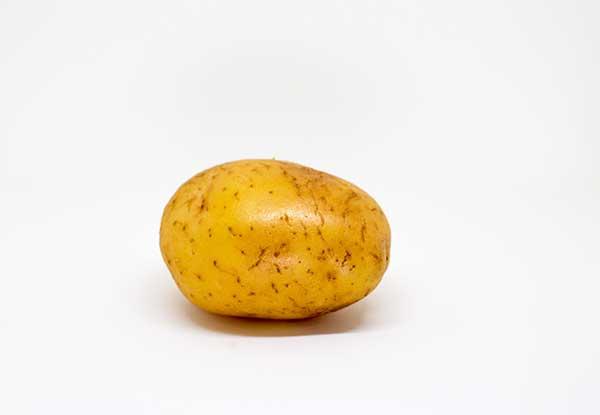The Incredible Potato

The Incredible Potato
There are many foods in nature’s pantry that are nutritional powerhouses, disease fighters, mood boosters, and weight loss dynamos. High on the list of dietary superpowers are chickpeas, romaine lettuce, salmon, carrots, peaches, and potatoes.
Potatoes? Aren’t they those colorless, starchy, high-calorie, nutritionally empty tubers? After all, it’s common knowledge that the more brightly colored a plant food is, the more nutrients it contains. Potatoes may be inexpensive and readily available throughout the year, but that doesn’t make them a good food choice–or does it?
In reality, spuds equal and surpass many of their plant-based counterparts in both nutrition and weight-loss capabilities. (The peels and the area underneath them are especially high in vital nutrients.) Here are some facts about the humble potato that may make you think twice before passing them up in the produce aisle in favor of their more popular and attractive neighbors.
The ABCs of Vitamins
Vitamin A. This nutrient, present in spades in orange-colored produce like sweet potatoes and peaches and leafy vegetables such as romaine lettuce, is well known for its eye-protective and antioxidant properties. Russett and red-skinned potatoes are good sources.
The B Vitamins. These water-soluble vitamins have a deserved reputation for their nerve-system benefits. Folate, in particular, is vital for the prevention of spinal cord birth defects in unborn babies. What is more, it plays a role in keeping anemia at bay. And Vitamin B6 has many perks:
- it converts carbs and proteins into glucose and amino acids, enabling the body to more easily use them
- it keeps the immune systems of older folks working properly
- it maintains communication between brain and nerve cells
- it prevents memory loss
- it wards off morning nausea (a boon for pregnant women)
One medium potato is a rich storehouse of the Bs: 15% of the recommended daily allowance of B3, 30% of B6, and 12% of folate.
Vitamin C. A sufficient amount of this nutrient enables collagen to avert skin damage caused by pollution, smoke, and the sun–and minimize wrinkles. Its antioxidant properties keep hearts healthy and prevent cancer. In addition, Vitamin C is essential for the proper absorption of iron from plant sources. 45% of the RDA of this essential vitamin is present in a single potato.
Minerals
Potassium. Move over, bananas. One medium potato (including the skin) provides a whopping 18% of the daily allowance of this mineral. Present in every cell, potassium assists in the transmission of nerve signals, maintains a healthy blood pressure, prevents leg cramps, and works to keep people hydrated.
Calcium. This mineral is vital for bone strength (especially in concert with phosphorous, also found in potatoes) and proper blood pressure. Even though spuds are relatively low in calcium (2% of the RDA), the mineral works in conjunction with others to keep us healthy.
Iron. The main task of this mineral is producing red blood cells, which carry oxygen to organs, muscles, and bones. As such, it wards off iron deficiency anemia and the condition in pregnant women and individuals with chronic disorders. With 9% of the RDA of iron, potatoes are a great source.
Magnesium. This nutrient is important for the proper absorption of calcium and is a natural blood pressure reducer. One medium potato weighs in at a healthy 12% of the RDA.
Other Benefits
Fiber. Potatoes are rich storehouses of fiber (4.7 grams). This quality makes them valuable for the prevention of constipation, weight loss, and a reduced risk of colorectal cancer. Raw and cold potatoes are higher in fiber than cooked or hot ones.
Water. Don’t let the appearance of potatoes fool you. They are approximately 70-80% water. As such, potatoes help keep people hydrated and at a healthy weight.
Choline. This nutrient does so much: assists mental functioning, (especially memory and learning); acts as a sleep aid; keeps muscles moving; helps the body absorb fat; and eases chronic inflammation.
Quercetin. Here is another reason to not peel potatoes. This flavonoid is highly anti-inflammatory and a vital antioxidant–and is present in potato skins.
Weight Management. Potatoes are not only a staple for dieters. People who want to add a few pounds will discover they are a weight-gain powerhouse. Their high concentration of carbohydrates (augmented by Vitamins B-complex and C, which assist in carb absorption) is the key.
Digestion. The above-mention carbohydrates are a boon for digestion. People who have digestive problems find potatoes an easy-to-tolerate and nutritious food.
Next time you look a potato in the eye, think about all the perks residing in the humble tuber. Take a few home, cook them up with thyme and parsley (and leave off the butter and mayo), and you’ll have a palate-pleasing, healthful addition to any meal.
See also:




